Committee for the Liberation of the Peoples of Russia
| Committee for the Liberation of the Peoples of Russia | |
|---|---|
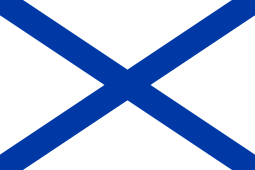 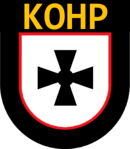 KONR flag and KONR shoulder sleeve insignia | |
| Active | 14 November 1944 – 14 February 1946 (officially) |
| Country | Soviet Union |
| Allegiance |
|
| Branch |
|
| Garrison/HQ |
Berlin, Germany (until 1945) Karlovy Vary, Germany (from 1945) |
| Nickname(s) | Vlasovtsy (Власовцы) |
| March | We Go on the Wide Fields (Мы идём широкими полями) |
| Engagements | |
| Commanders | |
| Notable commanders |
Andrey Vlasov Mikhail Meandrov (interum chairman of presidium) |
The Committee for the Liberation of the Peoples of Russia (Russian: Комитет освобождения народов России, Komitet osvobozhdeniya narodov Rossii, abbreviated as Russian: КОНР, KONR) was a committee composed of military and civilian anti-communists from territories of the Soviet Union (most being Russians). It was founded with the approval and sponsorship of Nazi Germany on November 14, 1944, in German-controlled Prague (purposely chosen because it was a Slavic city that was still not under Soviet control).
The committee's stated goals were
- "The overthrow of Stalin's tyranny, the liberation of the peoples of Russia from the Bolshevik system, and the restitution of those rights to the peoples of Russia which they fought for and won in the people's revolution of 1917"
- "Discontinuation of the war and an honorable peace with Germany"
- "Creation of a new free people's political system without Bolsheviks and Exploiters"
The committee sought to overthrow the regime of Joseph Stalin in the Soviet Union via an independent liberation army, which would be armed by and work in alliance with Nazi Germany. The committee expressed its support for the creation of a new democratic government in Russia. The goals of the committee were embodied in a document known as the Prague Manifesto. The manifesto's fourteen points guaranteed the freedom of speech, press, religion, and assembly, as well as a right to self-determination of any ethnic group living in territories belonging to Russia.
The Prague Manifesto did not contain any explicit anti-semitic or other racially inspired rhetoric, which caused a conflict with many Nazi propagandists. Although, criticism aimed at the Western Allies (specifically US and UK) was included in the manifesto's preamble.
The "exploiters" referred in the stated goals of the committee were capitalists and political allies of plutocracy.
The chairman of the committee was General Andrey Vlasov, who also commanded the Russian Liberation Army. The committee was viewed as the political arm of the Russian Liberation Army, although it also united several Ukrainian and other ethnic forces that were anti-Soviet.
After the surrender of Germany to the Allies, the committee ceased to operate—its members rechanneling their energy towards saving the Russian Liberation Army and other former Soviet citizens who had collaborated with the Axis Powers from forced repatriation to the Soviet SMERSH. During the immediate post war period, several new organizations sprang up that intended to continue the committee's goal of fighting communism (i.e., the Union of the St. Andrew Flag; the Committee of United Vlasovites, or Vlasovtsy, followers of Vlasov; the Union of Battle for the Liberation of the Peoples of Russia), started by veterans of the committee and the Russian Liberation Army who managed to escape forced repatriation to the Soviet Union. Two latter organizations participated in US-led efforts to form a united anti-Soviet platform of Soviet emigres.
According to National Alliance of Russian Solidarists (NTS) author Boris Prianishnikov, Vlasov had personally given the chairman of NTS, Victor Baidalakov, the written authority to preside over the committee upon his absence/disappearance, but Baidalakov did not act upon this mandate.
In the United States, a CIA-led organization with a similar name, the American Committee for the Liberation of the Peoples of Russia, was founded in the late 1940s, and became known for their propaganda broadcaster Radio Liberty, which was run by the Central Intelligence Agency and later funded by the United States Congress. It operated from Munich, in West Germany.
Gallery
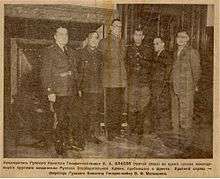 Leaflet of the Russian Liberation Army leaders in 1942
Leaflet of the Russian Liberation Army leaders in 1942 Manifestation of the Committee in Berlin, November 1944
Manifestation of the Committee in Berlin, November 1944 Andrey Vlasov's open article explaining his defection: "Why I chose the path of struggle against Bolshevism" (page 1)
Andrey Vlasov's open article explaining his defection: "Why I chose the path of struggle against Bolshevism" (page 1) Vlasov's article (page 2)
Vlasov's article (page 2)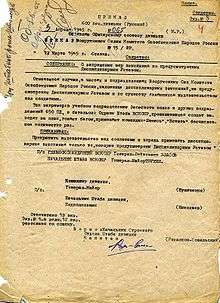 General Vlasov's order to prevent Dedovshchina in all forces related to KONR
General Vlasov's order to prevent Dedovshchina in all forces related to KONR Camp Dabendorf: General Vlasov (2nd from left), General Trochin (1st from left) among German and ROA officers, 1944
Camp Dabendorf: General Vlasov (2nd from left), General Trochin (1st from left) among German and ROA officers, 1944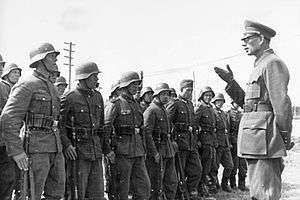 Vlasov inspects soldiers of the ROA, 1944
Vlasov inspects soldiers of the ROA, 1944 ROA soldiers in Belgium or France, 1944
ROA soldiers in Belgium or France, 1944
See also
| Wikisource has original text related to this article: |